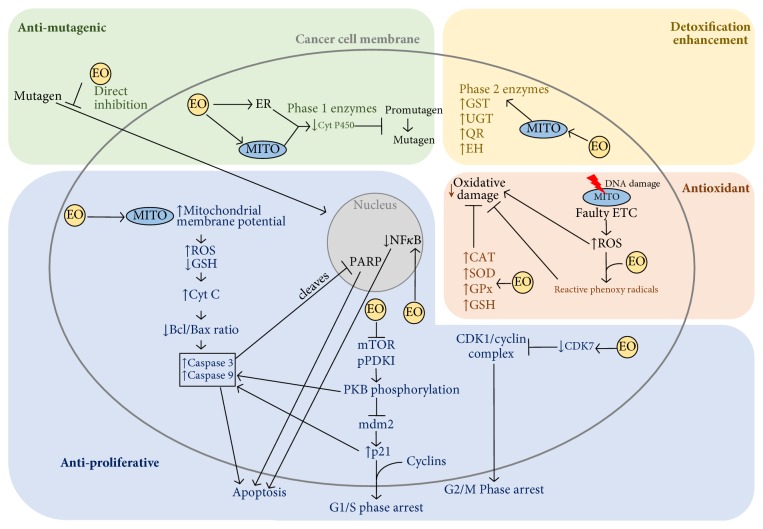Figure 2.
Essential oils cancer preventative and anticancer mechanisms of action. EOs possess antimutagenic, antiproliferative, antioxidant, and detoxifying capabilities acting on various pathways in the cancer cell as well as cancer preventative capabilities. EOs may directly inhibit mutagen entry into the cell. EOs can decrease phase I enzymes such as CytC, preventing mutagen formation, and increase phase II enzymes such as GST, UGT, QR, and EH for enhanced detoxification. EOs bind ROS forming reactive phenoxy radicals which bind further ROS and increase antioxidative enzymes CAT, SOD, GPx, and GSH thus preventing oxidative damage as a cancer preventative mechanism. EOs disrupt mitochondrial membrane potential causing an increase in ROS and decrease in GSH, release of CytC, resulting in a cascade of disruption in Bcl/Bax ratio, increase in caspase 3 and caspase 9 activity, and PARP cleavage, resulting in apoptosis. EOs suppress mTOR and pPDK1 causing PKB dephosphorylation, which dually acts to initiate caspase activity and deactivate mdm2, causing an increase in p21 to further initiate caspase activity resulting in apoptosis. Increased p21 also induces G1/S phase cell cycle arrest. EOs cause a decrease in CDK7, blocking CDK1/cyclin complex causing G2/M phase cell cycle arrest. Bax: B-cell lymphoma 2-associated X protein; Bcl-2: B-cell lymphoma 2; CAT: catalase; CDK: cyclin-dependant kinase; CytC: cytochrome C; CytP450: cytochrome P450; EH: epoxide hydrolase; EO: essential oil; ER: endoplasmic reticulum; ETC: electron transport chain; GPx: glutathione peroxidase; GSH: glutathione; GST: glutathione S-transferase; mdm2: murine double minute 2; mTOR: mechanistic target of rapamycin; MITO: mitochondria; NFκB: nuclear factor-κB; PARP: poly ADP ribose polymerase; pPDK1: protein pyruvate dehydrogenase kinase 1; PKB: protein kinase B; QT: quinone reductase; ROS: reactive oxygen species; SOD: superoxide dismutase; UGT: uridine 5′-diphospho-glucuronosyltransferase.

